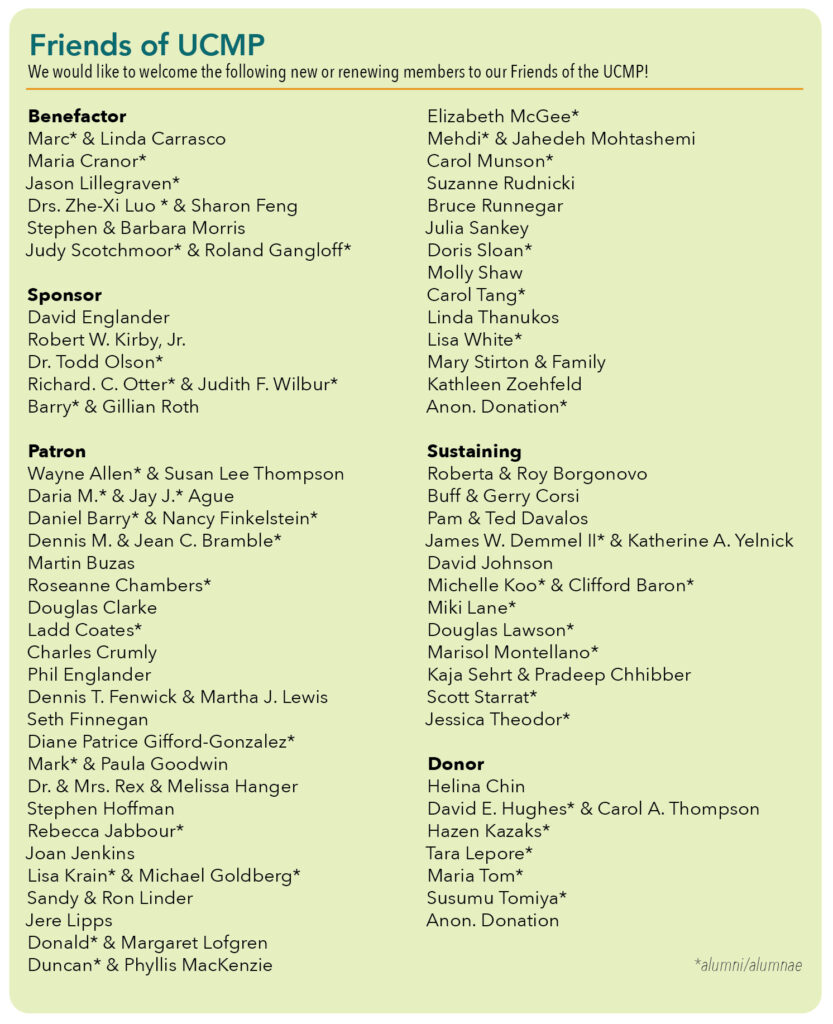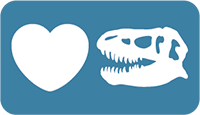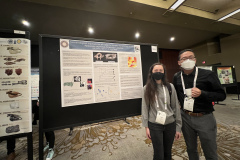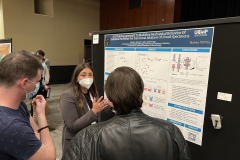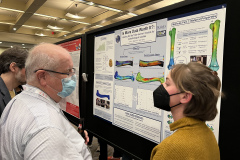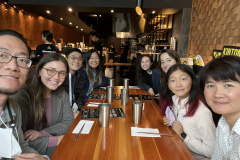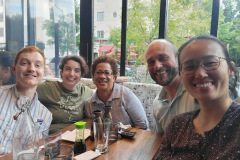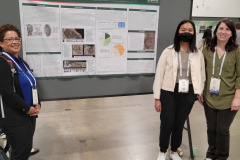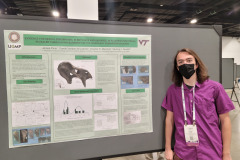In this issue:
- UCMP Year in Review
UCMP activities in 2022
- Director's Letter
Director's thoughts on the museum slowly reopening.
- UCMP's Strong Presence at Fall 2022 Conferences
UCMP well-represented at annual professional meetings.
- Understanding Science Updated!
Check out our updated educational web resources!
- Curator News
UCMP Curators share lab and publication updates.
- Collections Updates
We received new specimens and summer interns help digitize collections.
- Education & Outreach
The E&O Team are expanding projects and revisiting famous localities in mentioned in the archives.
- Student Updates
Graduation and summer activities.
- Friends of UCMP
UCMP Year in Review
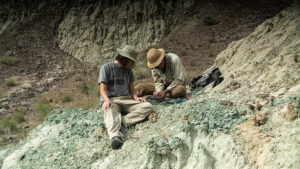
The UCMP community has had an eventful year coming out of our collective pandemic.
In this year end newsletter, we showcase the community’s resurgent presence at several conferences around the country. In Fall 2022 online and in person, we’ve debuted our refreshed UnderstandingScience.org educational web resource. UCMP curators lead the Field Methods in Paleobiology course to central Oregon in Spring 2022. We also congratulate our recent alums as they were able to take the commencement stage in May.
The UCMP wishes its Friends and community a happy holiday season and happy new year!
Director's Letter
It was not until we began to emerge from Covid that I began to realize how deeply the pandemic had impacted the UCMP. But now, as we return to the 3-D world of in-person meetings, the UCMP is beginning to fire on all cylinders again. It is wonderful to experience the museum powering up. This has included excellent student presentations at 2022 national and international meetings, including GSA and SVP, and the good news of graduates getting excellent jobs, including a tenure-track faculty position, a collections manager position, an education specialist, a consultant for exhibits, as well as postdoctoral research positions. Our Education and Outreach team continues to thrive with a wide range of funded and innovative projects from promoting diversity, equity and inclusion, to building a mobile escape room, led by Anna Thanukos, to introducing museum and library goers to evolutionary principles. Under the cloak of Covid, Anna also led the revamping of the Understanding Evolution and Understanding Science web resources. I am also delighted by the strong response to our goal of raising $250,000 for an endowment to honor Bill Clemens; we are now only $12,300 short of our goal. In fact, the importance of endowments is easy to overlook. With over a decade of campus budget cuts, over half the museum’s positions are now funded from the payout from Annie Alexander’s gift that established the UCMP 101 years ago. Now, for example, if we are ever to replace Mark Goodwin it will be with endowment support. We wish you all an enjoyable Holiday Season – and thank you all for your contributions that help keep the UCMP such a vibrant and productive community.
—Charles Marshall
UCMP's Strong Presence at Fall 2022 Conferences
UCMP was especially well-represented at annual meetings of major professional conferences in 2022 and members of our community received several notable awards! At the Geological Society of America (GSA) annual meeting held virtually and in Denver, CO on October 9-12, 2022, six graduate students and three undergraduate students presented, thanks in part to the generosity of UCMP donors whose support helps to fund travel grants and awards earned by students. Graduate students presenters include Tanner Frank and Kat Magoulick, from the Marshall Lab, Josh Zimmt and Ryan Yohler from the Finnegan Lab, and Jaemin Lee and Ben Muddiman from the Looy Lab. UCMP undergraduate students James Pinto and Sydney Booth presented, as did Kyra Bautista who participated in the iDigBio Natural History Collections Summer Internship program (see Collections and Research section) and is now an undergraduate student at UC San Diego. UCMP staff participants in the GSA conference included Pat Holroyd, Ashley Dineen, and Lisa White. Lisa also was honored as a newly elected Fellow of the Paleontological Society during the GSA conference. Curator Seth Finnegan also presented.
At the Society of Vertebrate Paleontology (SVP) annual meeting in Toronto, Canada on November 2 – 5, 2022, curator Jack Tseng and the following members of his FAVE (Functional Anatomy and Vertebrate Evolution) Lab presented: graduate students Emily Bogner (Runner-up for the SVP Colbert Poster Prize) and Celina Gilmore, and undergraduate student Leah Kahn (recipient of the Jackson School of Geosciences Student Travel Grant). Adjunct Curator Juan Liu and her graduate student Derrick Leong (recipient of the Jackson School of Geosciences Student Travel Grant) also presented. From the Hlusko Lab, Tara Lepore presented with undergraduate student Jenny Lu, and recent graduate alumni Sara ElShafie and Mackenzie Kirchner-Smith were among the presenters as was UCMP graduate alum and current UCMP Museum Associate Nick Spano.
Understanding Science Updated!
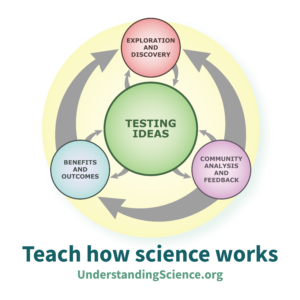
Following the successful launch of the newly enhanced Understanding Evolution website in 2021, we are pleased to announce that a modernized Understanding Science website went live in September 2022!
It offers a wide array of tools for teaching and learning about the nature and process of science. The project was also funded by a grant from the Institute of Museum and Library Services and involved updating and expanding key content, developing new features, and overhauling the look and feel of the site.
Aimed at K-16 audiences and the public, the revamped site includes:
- new features within Understanding Science 101, an easy-to-understand e-textbook
- a database of Science Stories highlighting an array of examples of how science works
- an interactive journaling tool based on our popular science flowchart, a visual representation of the process of science
- A database of lessons vetted by experienced teachers
We encourage you to explore the new site!
Curator News
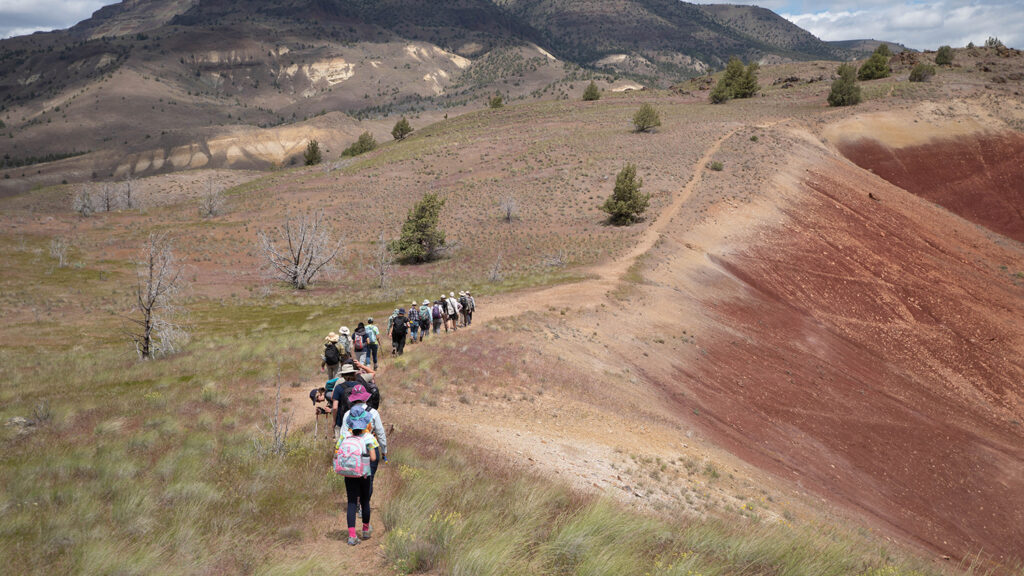
Assistant Curator Juan Liu visited the fossil fish collection in the Museum of Biology and the School of Earth Science and Engineering at Sun Yat-sen University in Guangzhou, China in August 2022. Juan also conducted a field trip on a joint expedition in southern China with colleagues from the Chinese Academy of Sciences and Sun Yat-sen University. This summer, Derrick Leong, a student in the Liu lab was selected as a graduate mentor for the IB Summer Undergraduate Research Experience. He served as a mentor for a recent Minerva University graduate, Adeena Ahsan, who helped him on the UCMP’s Red Hill, Nevada locality fossil fishes. Derrick and Adeena created a repository for all relevant Red Hill data, including digital scans of field notes, locality card information, and fossil occurrence data. They also contributed to the CalPhotos website by photographing hundreds of placoderm and osteichthyan fish fragments. Alongside their curatorial work, they processed multiple fossiliferous limestone slabs from previous Red Hill fieldwork through acid preparation. They utilized their repository of Red Hill specimen photos to identify these newly prepared fossils. At the end of the mentorship, Derrick and Adeena visited the Field Museum to compare the Red Hill locality specimens with the placoderms and osteichthyans from Scaumenac Bay in Quebec. Through CT scan observations of the Field Museum specimens, Derrick was able to distinguish varying lateral line canal morphologies between the UCMP and Field Museum specimens, advancing his own research progress.
In other good news from the Liu lab, Jennifer Hoeflich passed her qualification exam in April 2022 and she is now a Ph.D. candidate.
Assistant Curator, Jack Tseng, and students from his Functional Anatomy and Vertebrate Evolution (FAVE) Laboratory had a busy and productive spring and summer. Three of Jack’s graduate students prepared for and successfully passed their qualifying examinations this past Spring; Emily Bōgner, Sergio Garcia Lara, and Celina Gilmore are now all PhD candidates (see student section for their updates).
Jack and UCMP graduate student Peter Kloess co-mentored five undergraduate and post-baccalaureate research assistants during spring and summer 2022 as part of Jack’s NSF-funded project with Professor Leslea Hlusko and postdoc Chris Law to examine ‘nature vs. nurture’ in mammalian skeletal functional morphology. Project interns Ashley Fang, Diego de Nault, Tina Kuang, Sharvi Shah, and Mollie Tessler generated 3D renderings of mouse skeletons and took thousands of linear measurements across dozens of specimens for a quantitative genetics study.
Jack conducted fieldwork this summer in the Cuyama Badlands in southern California to resume UCMP’s presence in that basin for the first time since the 1960s. The project aims to improve the fossil record of middle to late Miocene terrestrial mammals in a biogeographic transition zone between coastal and Great Basin geographic provinces. Jack also returned to the Bridger and Washakie Basins in Wyoming for an ongoing project on carnivoramorphan diversity during the Eocene. Jack and graduate students returned to the Cuyama Badlands in October for more fieldwork.
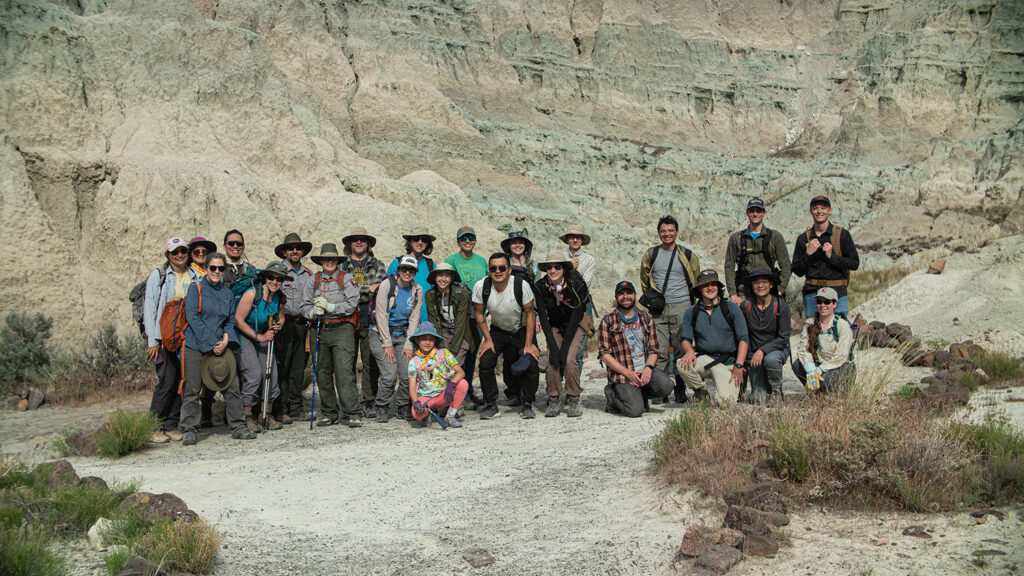
Jack’s activities this fall semester includes hosting two postdoctoral scientists: Dr. Adolfo Pacheco Castro from the Universidad Autónoma de Querétaro (Mexico) to work on an NSF-funded project on the Great American Biotic Interchange and UCMP fossil small mammals, and Dr. Alejandro Perez Ramos from the University of Malaga (Spain) to work on morphological proxies for diapause physiology in extant and Ice Age mammals using the MVZ and UCMP collections.
Jack, Cindy Looy, and Ivo Duijnstee, co-led a UCMP field trip during early summer with more than a dozen UCMP faculty, students, and staff to the John Day Basin in central Oregon and the Astoria Formation along the Oregon Coast. They were joined by paleontologists from the La Brea Tar Pits (Regan Dunn), National Park Service (Nick Famoso), and the University of Oregon (Sam Hopkins and Edward Davis) in the week-long excursion.
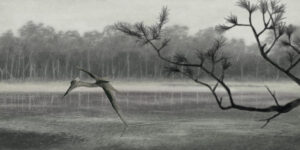
Curator Emeritus Kevin Padian had a productive year. With colleagues he produced in mid-2021 a compendium of knowledge of the microscopic bone structure of extinct vertebrates, and how this information informs our understanding of the growth, development, age structure, and physiology of everyone from ancient fishes to dinosaurs and mammals. Also with colleagues he produced a long-awaited monograph on the flying reptile (pterosaur) Quetzalcoatlus, the largest animal ever to take to the air, in a Memoir of the Society of Vertebrate Paleontology in late 2021. In early 2022, Professor Padian published a paper on the subject of why the arms of Tyrannosaurus rex were so short. He showed that all previous explanations were impossible on anatomical and functional grounds, and proposed a holistic, integrative hypothesis based on new information related to the probability that T. rex hunted in packs comprising juvenile to adult individuals. In the summer of 2022, Professor Padian was finally able to travel to the UK and France to reunite and discuss collaborations with his colleagues there, and to deliver lectures at the Natural History Museum (London) and the National Museum of Natural History (Paris).
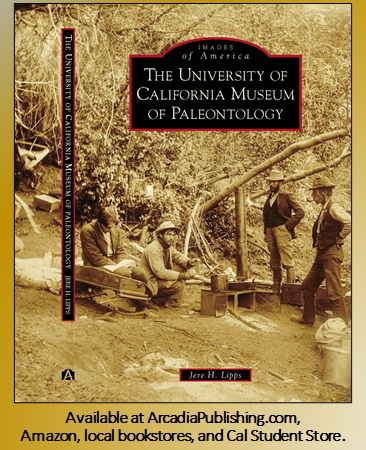
Curator Emeritus Jere Lipps‘ new book on the UCMP, The University of California Museum of Paleontology, was published by Arcadia Publishing in April 2022. It highlights the rich history of UCMP research, outreach, and education, and the people who have made fundamental discoveries in paleontology and inspired the work of others.
Collections Updates
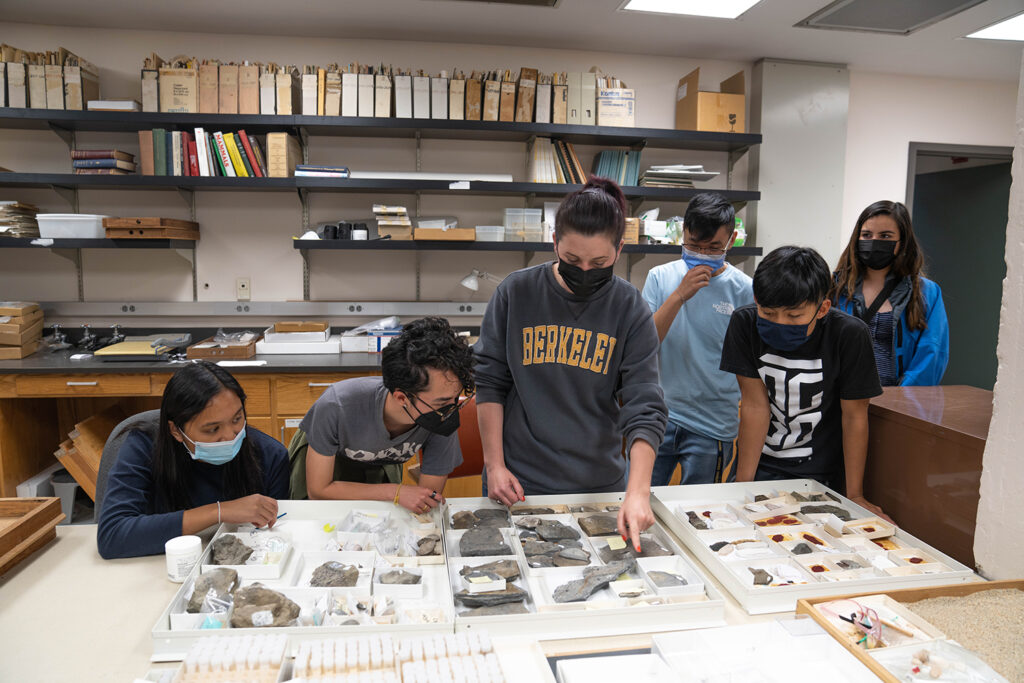
Ashley Dineen reports the Cambrian and Ordovician IMLS grant has entered its final year, and has hit several goals recently. Thanks to several undergraduate students and graduate students who worked over the summer (Tanner Frank, Emily Bōgner, and Ryan Yohler), we have digitized a total of 18,339 specimens (131% of goal), photographed 1,053 specimens (including the entire type collection; 105% of goal), and scanned and archived approximately 377 pages of field notes and correspondence (50% of goal). Results from the grant were presented at both the Society for the Preservation of Natural History Collections (SPNHC) in Edinburgh, Scotland and at the GSA Annual Meeting in Denver. UCMP participated in the iDigBio Natural History Collections Summer Internship program, which funds undergraduate students from local colleges to participate in an 8-week paid internship at their local natural history museum. Kyra Bautista (Mission College, currently UC-San Diego) worked with Ashley on digitizing the Cambrian and Ordovician invertebrate collection In addition, she completed a project measuring the body size and assessing the taphonomic preservation of UCMP’s helicoplacoid collection, the results of which was presented in a poster at the GSA Annual Meeting in October 2022. We are also proud to report Ashley was honored by her alma mater, the University of Wisconsin-Milwaukee, with the Graduate of the Last Decade (GOLD) Award from the UW-Milwaukee Alumni Association!
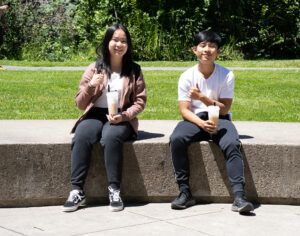
Senior Museum Scientist Patricia (Pat) Holroyd happily shared that after two very quiet summers in collections, we were able to welcome interns back and take part in two great internship programs in Summer 2022. The first of these was NSF’s iDigBio Natural History Collections Summer Internship program which funds undergraduate students from local colleges to participate in an 8-week paid internship at selected natural history museums. Kyra Bautista (mentioned above) and Ezra Alberts (Humboldt State University) interned with Pat on a project analyzing small mammals from a previously-undescribed Pleistocene cave site in northern California and with graduate student Emily Bōgner on a study of modern bears. Ezra plans to present the results of this work at the 2023 International Mammalogy Congress in Anchorage.
With support from University Development & Alumni Relations and the organization of Karen Iwasa at Achieve, UCMP was also able to offer paid 5-week internships to high school students from the Achieve program, working with Pat Holroyd and graduate student Derrick Leong. Vy Phan (Holy Names HS in Oakland) and Kevin Nguyen (Saint Joseph Notre Dame HS in Alameda) took on the massive task of digitizing and organizing thousands of pages of data for microfossils donated to UCMP, so that we will be able to capture these key data used to understand the geology of California. We are so grateful for all our interns’ hard work this summer.
On other grant news, Pat and Director of Education and Outreach Lisa White are happy to announce a new NSF-funded project, Wolf RACE (Resource Availability and Competition in Ecosystems) in collaboration with Robin Trayler and Sora Kim from UC Merced. This project will focus on understanding the role of wolves and dogs in both modern and fossil ecosystems through stable isotope analysis. Capitalizing on our previous IMLS grant to curate the McKittrick tar seep fossil collection, the new funding will focus on new radiocarbon dates and isotopic sampling of the McKittrick fauna and comparisons with Rancho La Brea. Our goal is to not only understand the role of different predators in these ecosystems, but to generate a wealth of new data for understanding the evolution of Central Valley ecosystems.
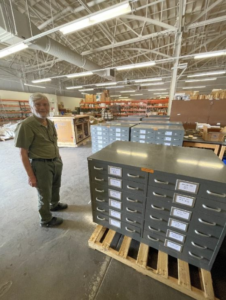
Senior Museum Scientist Diane Erwin shared news of a new paleobotany acquisition. This fall UCMP received nine cases of plant fossils from Professor Emeritus James A. Doyle in the Department of Evolution and Ecology at UC Davis. The collection reflects Prof. Doyle’s decades-long research interest in the origin and early evolution of flowering plants, as well as fossils collected during professional paleobotanical/botanical conferences and class field trips. Highlights include specimens from the Cretaceous Potomac Group of Maryland and Virginia and the Jurassic Monte de Oro Formation near Oroville, California.
Education & Outreach
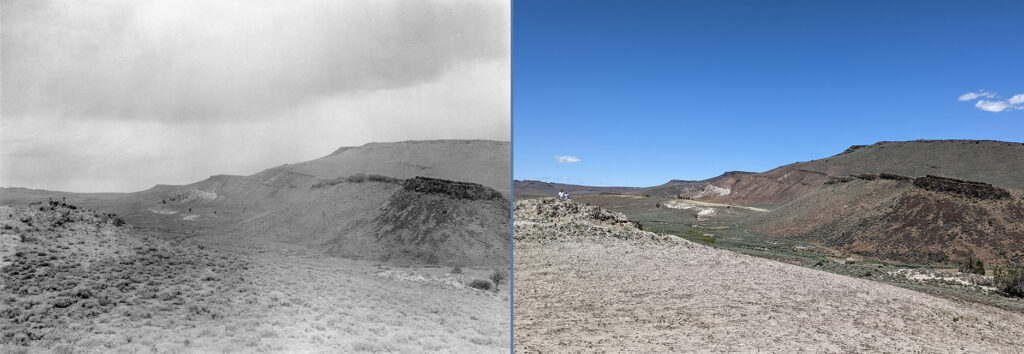
Congratulations to Director of Education and Outreach, Lisa White, who was awarded the 2022 Stephen Jay Gould Prize by the Society for the Study of Evolution! This annual award recognizes “individuals whose sustained and exemplary efforts have advanced public understanding of evolutionary science and its importance in biology, education, and everyday life in the spirit of Stephen Jay Gould.” Lisa’s work admirably fulfills these aims. In addition to helping lead our Understanding Evolution, Understanding Science, ACCESS Paleo, and STEM Escape programs, Lisa serves on a number of steering and advisory groups for the broader scientific and education communities. She has made particularly notable contributions promoting diversity, equity, and inclusion in the sciences and leads the Diversity and Inclusion Advisory Committee of the American Geophysical Union, as well as the International Ocean Discovery Program Broader Impacts and Outreach working group. Lisa joins an illustrious group of past awardees of the Gould Prize, including Sean Carroll, Francisco Ayala, Ken Miller, Eugenie Scott, and our own Judy Scotchmoor, whom Lisa succeeded in her position at the Museum. UCMP is proud to continue to advance our mission of improving public understanding of science, evolution, and the history of life!
Lisa and the UCMP community remain active locally and nationally in promoting greater diversity, equity, inclusion, and accessibility in geoscience. Lisa, graduate student Tara Lepore, and Museum Associate Nick Spano all attended the AGU Chapman Conference: Second National Conference for Justice in Geoscience in Washington, DC in August 2022. They took part in the collective documentation of what justice can look like over the next 50 years of policy, social action, and community building. While in DC Lisa, Tara, and Nick caught up with UCMP alums Lucy Cheng and Ash Poust.
Project Scientist Jessica Bean was awarded a 2-year grant from the Gordon and Betty Moore Foundation to support her work with BSCS Science Learning on the FieldScope Project for community and citizen science. She will be collaborating with community science leaders across the country to expand the reach of partnering projects and enhance data visualization and analysis tools for informal and formal education. Jessica is leading a group of climate education colleagues from across the country as one of the organizations supporting the California Department of Education-funded Climate Change and Environmental Justice Program. This project will develop new interdisciplinary instructional units for K-12 California classrooms. Jessica and colleagues Betsy Mitchell, Joanna Totino, and Sarah Pedemonte at the Lawrence Hall of Science and Bay Area Science Project were awarded three years of funding from the California Science Project for the continuation of Understanding Global Change Professional Learning Communities for high school educators.
This year Jessica also worked on a number of media projects. She developed a STEM toolkit for the PBS Ken Burns Benjamin Franklin series released in 2022. This toolkit features materials from the Understanding Global Change and Understanding Science projects. In addition Principal Editor Anna Thanukos and Jessica partnered with the film LUMINOUS to create materials for undergraduate education about the nature and process of science that feature resources from Understanding Science.
This past July, David Smith (retired Visual Communications Specialist) retraced the route of Annie Alexander’s 1901 Fossil Lake Expedition to south-central Oregon. His guide was a scrapbook in the UCMP Archives containing some 120 photographs with short, day-by-day descriptions of the expedition’s activities. He was accompanied by his wife, Colleen Whitney, UCMP’s first staff webmaster (2000-2004), and friend, Kirk Hastings, a retiree from the California Digital Library, a unit within the UC Office of the President (UCOP). In 2017 David and Kirk retraced Annie’s 1905 Saurian Expedition to the West Humboldt Mountains of Nevada and they were finally able to return again. See Dave’s blog post for more of this incredible story.
Student Updates
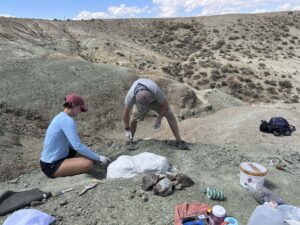
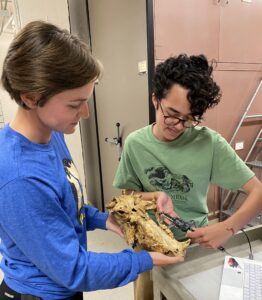

In May 2022 Tara Lepore received a Teaching Effectiveness Award from the UC Berkeley Center for Teaching and Learning. The award recognizes her outstanding contribution to teaching and learning as a Graduate Student Instructor (GSI) after receiving the Outstanding GSI Award during the spring semester. Tara was honored for assessing the impact and effectiveness of Universal Design for Learning (UDL) and disability awareness in science classes. In June, Tara attended the annual meeting of the Society for the Preservation of Natural History Collections (SPNHC) in Edinburgh, Scotland and presented ongoing education and outreach research with her sister, Katrina Lepore, which focuses on neurodiverse communities as crucial contributors to paleontology exhibits and collections perspectives, using inclusive museum design and self-advocacy. Katrina identifies as intellectually disabled and Tara identifies with a number of non-apparent disabilities. Tara mentored an Integrative Biology undergraduate student, Jenny Lu, into the world of qualitative research on paleontology and disability perception. Jenny joined Tara for her first annual meeting of the Society of Vertebrate Paleontology in Toronto in November. With support from a UCMP Research Grant and the Institute for the Study of Mongolian Dinosaurs (ISMD) led by Dr. Bolortsetseg Minjin, Tara’s eventful summer brought her to rural Gobi Desert in Mongolia for three weeks to develop teacher trainings and co-lead a summer camp for high school students on the paleontology and geology of Bayanzag (the Flaming Cliffs). With the group, she discussed accessibility and disability in education, part ofher dissertation interests. Tara hopes it will be the beginning of an ongoing collaboration between UCMP and ISMD, fostering cross-cultural exchange while providing more opportunities for paleontology education and appreciation of Mongolian language and culture.

Celina Gilmore received a Mentored Research Award (MRA) Fellowship from the UC Berkeley Graduate Division for her work on the functional morphology of the mammalian vertebral column.
Jackie Galvez received an Achievement Rewards for College Scientists (ARCS) Fellowship from the UC Berkeley Graduate Division for her work on morphological and dietary niche differentiation in freshwater fish populations. Jackie also received an Association for Environmental Health and Sciences Foundation student travel grant to present her research at SICB 2023.
Sergio Garcia Lara received a Consejo Nacional de Ciencia y Tecnología (CONACYT) Scholarship from the México government for his work on mammalian predator-prey coevolution during the Neogene in North America.
Undergraduate student Leah Kahn (co-mentored by Jack and Seth Finnegan) received a Summer Undergraduate Research Fellowship (SURF) from UC Berkeley’s College of Letters and Science for her work on the mechanics and defensive functions of gastropod shell ornamentation. Leah is also conducting IB honors thesis research on the same topic.
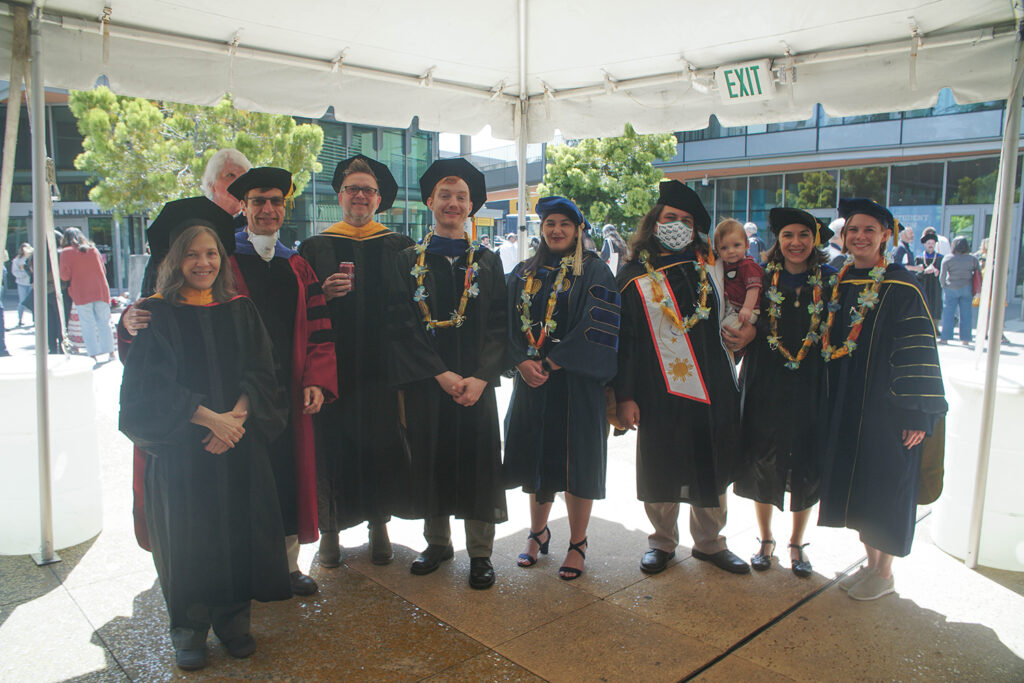
Finally, many congrats to our students who walked in the 2022 IB Commencement Ceremony, the first in-person ceremony since 2019. Jack Tseng, in his cowboy hat, was the keynote speaker and Sara ElShafie (Padian Lab, now Director at WeberShandwick) was the graduate student commencement speaker. Best wishes to Hlusko Lab graduates Mariane Brasil (now research associate at the Berkeley Geochronology Center), Peter Kloess (now Lecturer at Whittier College), Catherine Taylor, as well as Nicholas Spano and Ben Muddiman from the Looy Lab, Mackenzie Kirchner-Smith from the Bowie Lab (now a Curator of Life Sciences at the San Bernardino County Museum), Daniel Latorre from the Marshall Lab, and undergrad Sapon Chupongstimun from the Finnegan Lab!
Friends of UCMP
We would like to welcome the following new or renewing members to our Friends of the UCMP!
